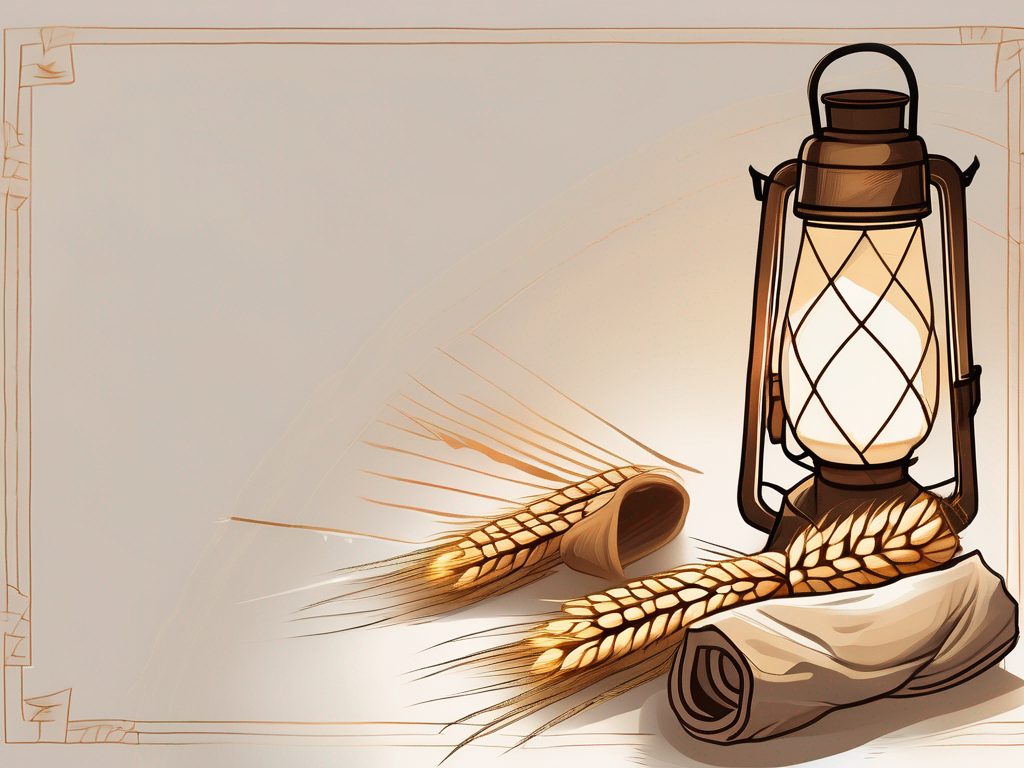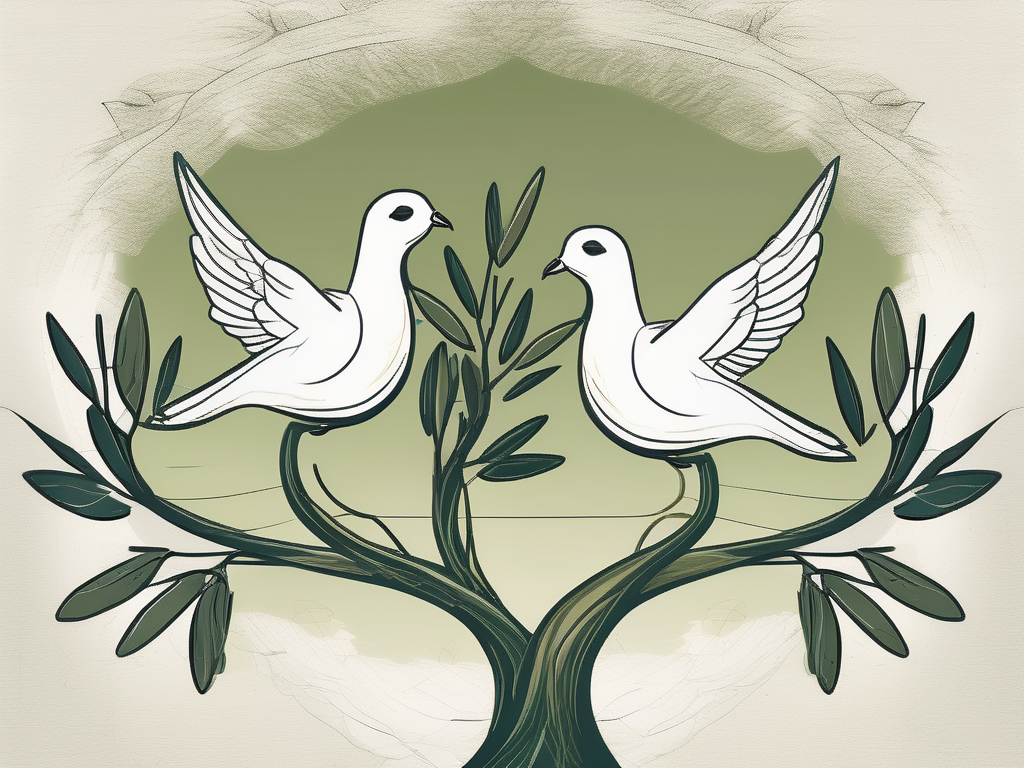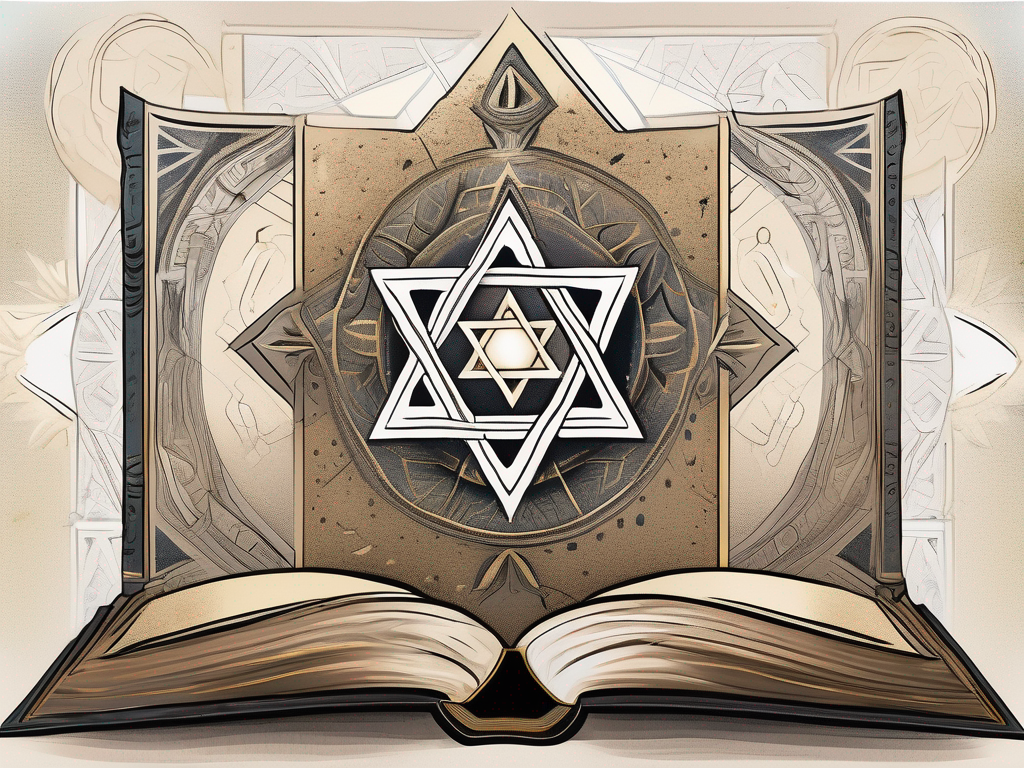The Book of Ruth is a fascinating and deeply meaningful part of the Bible that is often overlooked. In this article, we will dive into the profound teachings that can be found in the story of Ruth and glean insights that are relevant to our lives today.
Understanding the Context of the Book of Ruth
To fully grasp the significance of the Book of Ruth, it is crucial to understand its historical and cultural context. This will allow us to appreciate the lessons contained within the narrative even more deeply.
The Book of Ruth is not just a simple story; it is a window into the lives of the Israelites during a tumultuous time. It takes place during the era of the judges, a period marked by moral decline and political instability. The Israelites were living in a time when everyone did what was right in their own eyes, and the consequences of their actions were devastating.
Through the story of Ruth, we gain insight into the struggles and challenges faced by the Israelites. It serves as a reminder that even in the midst of chaos and uncertainty, there is still hope and redemption.
The Historical Background of Ruth
Set during the time of the judges, the Book of Ruth provides a glimpse into the everyday life and struggles of the Israelites. It takes place during a period of great moral decline and serves as a contrast to the instability and trouble surrounding the characters.
During this time, the Israelites faced numerous challenges, including foreign invasions, idolatry, and internal conflicts. The story of Ruth unfolds against this backdrop, highlighting the resilience and faith of the characters in the face of adversity.
It is important to note that the events in the Book of Ruth took place after the Israelites had settled in the Promised Land. However, the consequences of their disobedience and idolatry were still evident in the hardships they faced.
The Main Characters in Ruth
The central figures in the Book of Ruth are Ruth herself, Naomi, and Boaz. Ruth, a Moabite, demonstrates remarkable loyalty and faithfulness to Naomi, her mother-in-law, even in the face of immense hardship. Boaz, a godly man and relative of Naomi, plays a crucial role in redeeming both Ruth and Naomi from their dire circumstances.
Ruth’s decision to stay with Naomi after the death of her husband is a testament to her character and devotion. Despite the cultural barriers and the challenges she faced as a foreigner, Ruth remained steadfast in her commitment to her family and her faith.
Boaz, on the other hand, exemplifies the qualities of a righteous man. His kindness and generosity towards Ruth and Naomi not only provide them with much-needed support but also serve as a reflection of God’s love and provision.
Through the lives of these characters, the Book of Ruth teaches us valuable lessons about loyalty, faith, and the redemptive power of God’s grace. It reminds us that even in the darkest of times, there is always hope and the possibility of restoration.
The Central Themes in the Book of Ruth
Digging deeper into the narrative, we discover powerful and enduring themes that speak to the human experience across time and culture.
The Book of Ruth is not just a simple love story, but a profound exploration of loyalty, faithfulness, redemption, and restoration. Through the lives of Ruth, Naomi, and Boaz, we are given a glimpse into the complexities of human relationships and the divine providence that guides them.
Loyalty and Faithfulness
Ruth’s unwavering loyalty to Naomi is truly remarkable. Despite being a foreigner in the land of Israel, Ruth chooses to stay with Naomi and embrace her God. This serves as a powerful reminder of the importance of remaining faithful to our loved ones, even in the most challenging of circumstances.
As we delve deeper into the story, we see how Ruth’s loyalty is not just a fleeting emotion, but a steadfast commitment. She willingly leaves behind her own people and culture to accompany Naomi back to Bethlehem. Ruth’s loyalty is not limited to mere words; she demonstrates it through her actions and sacrifices.
Furthermore, Ruth’s faithfulness extends beyond her relationship with Naomi. She embraces the God of Israel and becomes an integral part of His plan. Her faithfulness is not just to her mother-in-law, but to God Himself.
Redemption and Restoration
The story of Ruth showcases the concept of redemption. Boaz acts as a kinsman-redeemer, fulfilling his duty to the family by marrying Ruth and restoring their inheritance. This illustrates God’s desire to redeem and restore His people, foreshadowing the ultimate redemption and restoration found in Christ.
Boaz’s role as a kinsman-redeemer goes beyond mere legal obligations. He demonstrates compassion and selflessness, going above and beyond what is required of him. In doing so, he becomes a symbol of God’s redemptive love for His people.
The redemption and restoration in the Book of Ruth are not limited to the physical realm. It is a story of hope and renewal, where brokenness is transformed into wholeness. Through the union of Ruth and Boaz, a new family is formed, and the lineage of King David is established.
Ultimately, the themes of loyalty, faithfulness, redemption, and restoration in the Book of Ruth resonate with readers across time and culture. They remind us of the power of love, the importance of remaining faithful to our commitments, and the hope of redemption and restoration that is available to all who seek it.
Theological Insights from the Book of Ruth
Looking beyond the narrative, the Book of Ruth offers theological insights that can deepen our understanding of God’s character and His plans for humanity.
God’s Sovereignty and Providence
Throughout the story, we witness God’s sovereignty and providential guidance. From the moment Ruth decides to stay with Naomi to the divine orchestration of her meeting with Boaz, every event serves a purpose in fulfilling God’s plan. This reminds us of the comforting truth that, even in the midst of uncertainty, God is in control.
When Ruth made the selfless decision to remain with Naomi, she unknowingly stepped into the path that God had set for her. It was through her unwavering loyalty and commitment that God was able to work His divine plan. Ruth’s journey from Moab to Bethlehem was not a mere coincidence, but a carefully orchestrated series of events that showcased God’s sovereignty.
Furthermore, the meeting between Ruth and Boaz was not a random encounter, but a providential arrangement. Boaz, a kinsman-redeemer, played a crucial role in the redemption of Ruth and Naomi. His willingness to fulfill his duty and marry Ruth not only demonstrated God’s provision, but also foreshadowed the ultimate redemption that would come through Jesus Christ.
The Role of Women in God’s Plan
The significance of women within God’s plan is evident in the Book of Ruth. Ruth and Naomi both play vital roles in the lineage of Jesus. This emphasizes the importance of women in the unfolding of salvation history and reminds us that God uses individuals from all walks of life to accomplish His purposes.
Ruth, a Moabite woman, defied societal expectations and cultural barriers to follow God and serve Naomi. Her faithfulness and loyalty were not only rewarded with a loving husband and a secure future, but also with a place in the genealogy of Jesus. Through Ruth, we see that God values and honors the contributions of women in His redemptive plan.
Similarly, Naomi’s role as a mother-in-law and mentor to Ruth highlights the importance of intergenerational relationships in God’s plan. Despite experiencing great loss and hardship, Naomi remained steadfast in her faith and provided guidance and support to Ruth. Her wisdom and resilience serve as a testament to the strength and influence of women in shaping the course of history.
By including the stories of Ruth and Naomi in the biblical narrative, God affirms the inherent worth and value of women. Their inclusion challenges societal norms and reminds us that God’s plan for salvation encompasses all individuals, regardless of gender or background.
Life Lessons from the Book of Ruth
Beyond theological insights, the Book of Ruth offers practical wisdom that we can apply to our lives today. Let’s delve deeper into some of the key lessons we can learn from this beautiful story.
The Power of Humility and Obedience
Ruth’s humility and obedience are key factors that lead to her eventual redemption and restoration. Her willingness to leave behind her own comfort and security, coupled with her obedience to Naomi’s instructions, demonstrate the transformative power of humility and obedience in our own lives.
Humility is often misunderstood as weakness, but Ruth’s story shows us that it is a strength that can lead to remarkable outcomes. By humbling herself and putting the needs of others before her own, Ruth opens herself up to new opportunities and blessings. Her decision to follow Naomi, despite the uncertainty and challenges that lay ahead, is a testament to her humility and trust in God’s plan.
Obedience, too, plays a crucial role in Ruth’s journey. She listens to Naomi’s guidance and follows her instructions without question. This obedience not only demonstrates her respect for Naomi’s wisdom but also shows her faith in God’s guidance. Ruth’s unwavering obedience leads her to the fields of Boaz, where she finds favor and protection.
As we reflect on Ruth’s example, we are reminded of the importance of humility and obedience in our own lives. When we humble ourselves and submit to God’s will, we open ourselves up to His transformative power and guidance. It is through humility and obedience that we can experience true redemption and restoration.
The Impact of Kindness and Love
Throughout the story, we see numerous acts of kindness and love. From Ruth’s dedication to caring for Naomi to Boaz’s generous acts of provision and protection, these acts of kindness have a profound impact on the characters involved. This reminds us of the transformative power of small acts of kindness and love in our relationships and communities.
Ruth’s unwavering commitment to Naomi is a beautiful example of selfless love. Despite her own grief and loss, Ruth chooses to stay by Naomi’s side and care for her. Her loyalty and devotion are not only a testament to her character but also a reflection of God’s love for us. Ruth’s love for Naomi inspires us to prioritize the needs of others and extend kindness to those around us.
Boaz, too, exemplifies the power of kindness and love. His generosity towards Ruth and Naomi goes beyond what is expected. He provides for their needs, protects them, and ultimately becomes their kinsman-redeemer. Boaz’s actions remind us of the impact we can have when we go above and beyond to show love and kindness to others. Even the smallest acts of compassion can make a significant difference in someone’s life.
As we consider the lessons from Ruth’s story, we are challenged to examine our own actions and attitudes towards kindness and love. Are we actively seeking opportunities to show kindness to others? Are we willing to go the extra mile to demonstrate love and compassion? Ruth and Boaz’s example encourages us to be intentional in our relationships, to be agents of kindness and love in a world that often needs it the most.
The Significance of Ruth in the Bible
As we explore the significance of Ruth within the larger biblical narrative, we uncover connections that point to God’s redemptive plan for humanity.
Ruth’s Role in the Genealogy of Jesus
Ruth’s inclusion in the genealogy of Jesus, as recorded in the Gospel of Matthew, highlights her importance in God’s plan of salvation. She is a testament to the fact that God can work through anyone, regardless of their background or ethnicity, to accomplish His purposes.
The Book of Ruth as a Foreshadowing of Christ’s Redemption
The story of Ruth serves as a foreshadowing of Christ’s ultimate act of redemption and restoration. Ruth’s decision to align herself with the people of God and her subsequent redemption by Boaz mirrors our own journey of salvation through faith in Jesus Christ.
In conclusion, the Book of Ruth is a treasure trove of profound teachings that offer insights into loyalty, redemption, and God’s plan for humanity. By understanding the context, exploring the central themes, delving into theological insights, and drawing practical life lessons, we can gain a deeper appreciation for this remarkable biblical narrative. May the lessons from Ruth’s story inspire and transform our own lives as we seek to live in faithfulness, obedience, and love.












